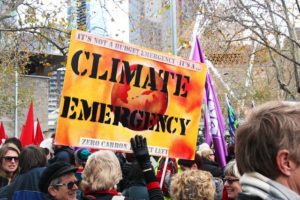(SMART ALEC) ATLANTA, Georgia — State and local governments ought to immediately consider and adopt legislation adopting a climate emergency as a predicate to substantive action to prevent, reduce, and mitigate climate change.

SMART ALEC recommends adoption of this resolution in conjunction with the creation of an appropriate legislative committee, where necessary, to address climate change and other emergency environmental issues.
Cities across the country have already begun adopting climate change emergency resolutions, in a flurry of activity. Hoboken, New Jersey, became the first in the U.S. and third in the world, according to the Climate Emergency Declaration organization, which has been promoting this work.
New York City adopted such a resolution on June 26, 2019.
https://climateemergencydeclaration.org/new-york-city-council-declares-a-climate-emergency/
Almost nine hundred local governments in some eighteen countries have adopted climate emergency resolutions, according to Climate Emergency Declaration.
In an appropriate race to the top, cities are looking to take action above and beyond what is required at the state and federal levels; and states are looking to take action above and beyond what is required at the federal level in legislation such as the Clean Air Act and the Clean Water Act.
State and local governments have the authority, per the police power doctrine in common law, to address the health, safety, and welfare of their residents, as long as they have not been preempted by a higher level of government law.
This Model Ordinance contains three parts. Part one references the local governments’ authority to act pursuant to health, safety, and welfare. Part Two utilizing some of the New York resolution’s whereas clauses speaking to national and international studies, providing data-driven justification for the declaration. Part Three adds an example of clauses speaking to climate change’s local impacts, which can be tailored for each jurisdiction..
####
A RESOLUTION by
A RESOLUTION DECLARING A CLIMATE EMERGENCY; AND FOR OTHER PURPOSES.
[PART ONE: HEALTH SAFETY AND WELFARE]
WHEREAS, it is incumbent upon the City / County / State of __________________ to protect the health, safety, and welfare of its residents; and
WHEREAS, climate change is an emergency that has the potential to devastate our very civilization; and
[PART TWO: INTERNATIONAL DATA]
WHEREAS, on October 8, 2018, the United Nations International Panel on Climate Change (“IPCC”) released a special report, which projected that limiting warming to the 1.5°C target this century will require an unprecedented transformation of every sector of the global economy over the next twelve years; and
WHEREAS, on November 23, 2018, the United States Fourth National Climate Assessment (“NCA4”) was released and details the massive threat that climate change poses to the American economy, our environment and climate stability, and underscores the need for immediate action to address a climate emergency at all levels of government; and
WHEREAS, according to the National Aeronautics and Space Administration (NASA)’s Goddard Institute for Space Studies (GISS), global temperatures in 2018 were .83°C (1.5°F) warmer than the 1951 to 1980 mean, and the past five years are collectively the warmest in modern history; and
[PART THREE: LOCAL DATA – Here drafters should include information that is unique or specific to climate change’s impact on your jurisdiction. This draft uses information regarding Atlanta from the recent testimony by Mayor Keisha Lance Bottoms to the U.S. Senate on climate change.]
WHEREAS, Atlanta’s inland geography is a major factor that contributes to unique climate circumstances in our city; and
WHEREAS, Atlanta ranks third nationally for increases in the Urban Heat Island effect; and
WHEREAS, if current trends continue, Georgia is projected to see an increase in dangerous heat days from twenty days a year today, to more than ninety per year by the year 2050; and
WHEREAS, by that time, 2050, the average high summertime temperature in Atlanta is projected to be 92.6 degrees, a jump of 4.1 degrees; and
WHEREAS, that increase in temperature will lead to the increased frequency of weather extremes, and make drought and extreme wet weather more frequent and longer-lasting; and
WHEREAS, hurricanes and sea level rise in coastal regions of the Southeast are likely to create climate refugees, who seek rapid resettlement in Atlanta, as we saw in the aftermath of Hurricane Katrina,
NOW, BE IT THEREFORE RESOLVED:
Section 1:
That the ________________ joins cities, states, and nations across the world in declaring a Climate Emergency that is global in scope and that has the potential to severely negatively impact the people of ___________________.
Section 2:
That all ordinances and resolutions in conflict herewith are hereby waived to the extent of the conflict.
Section 3:
That the provisions of Sections 1 and 2 take effect immediately upon this resolution becoming law.
(END)
